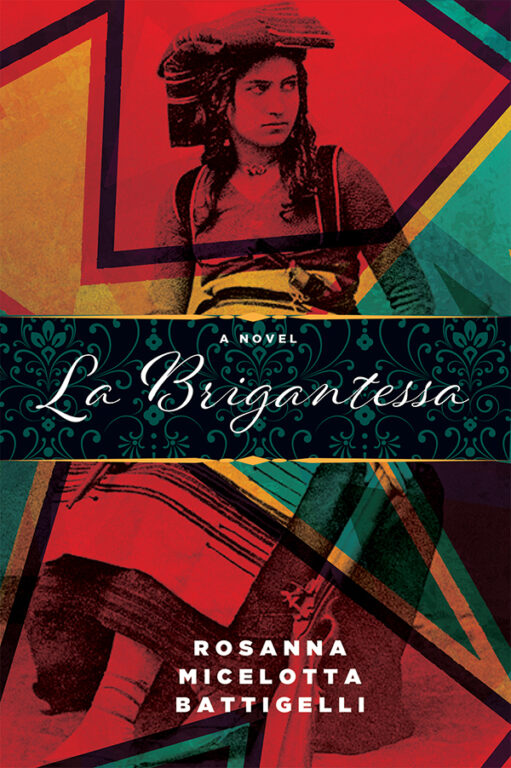by

La Brigantessa is a novel set in the aftermath of Italy’s 1861 Unification, a turbulent period known as ‘The Decade of Fire,’ (1860-1870) when scores of brigands (outlaws) rebelled against the harsh policies imposed by the new government, which in turn ordered the destruction of the brigands and any-one harboring them. Gabriella Falcone is a peasant girl from Calabria who works for Don Simone, the parish priest. She is forced to flee her hamlet in 1862 after committing a crime in self-defense. Knowing her fate will be life imprisonment at best, the priest leads her through the harsh Aspromonte mountain range to seek refuge in an isolated monastery, but they soon fall into the hands of brigands. Gabriella is catapulted into a world she has only ever heard about in nervous whispers, a world where right and wrong, justice and vengeance take on new meanings. She is drawn into the role of brigantessa, and in the company of the brigand chief, Stefano Galante, she discovers that the convictions she once held dear no longer have a place in this wild, unlawful territory. Gabriella wonders if she will ever clear her name and be able to return to a normal life. Experiencing the harsh existence of a brigandess, she discovers what she must do to survive and to ultimately vindicate herself.
The brothers arrived late last evening amidst an unexpected downpour. Gabriella was roused from her sleep by her father, who rushed out to shelter the horses for the visitors, and to show the driver the barn loft where he could stay for the night. She was to light the fire and heat up the cauldron of soup she had made earlier in the day. In the meantime, Don Simone would be taking the brothers to the guest room, where they would remove their drenched clothing.
READ MOREThere was something about Signor Alfonso that she could not have known without seeing it with her own eyes. There was a hardness to him, despite his ample frame. A hardness around his eyes. She had caught a look that he directed at her father’s back when he had come to the kitchen to get some food for the driver. It had lasted only a moment before Signor Alfonso turned around to finish his soup, but Gabriella felt a stab of dismay when she saw it—a look of disdain, disgust even. She glanced at her father then, saw him in his well-worn trousers, sodden and stained, saw his gaunt features, his hair plastered to his forehead, saw his calloused hands gripping a small tureen and a hunk of bread. A labourer. A peasant so obviously below Signor Alfonso. The slight, unnoticed by her father, stung her, and she felt herself burning, as humiliated as if the glance had been directed at her.
COLLAPSECristina, on Goodreads, January 6, 2019 wrote:"A Fascinating Novel about Italy’s History. La Brigantessa is a fascinating novel that sweeps the reader into one of the most unsettled historical decades of Italian History – the Unification of Italy, which took place between 1860 to 1870. What impressed me most about this novel was how factual history was seamlessly interwoven with a handful of fictional characters and how they were impacted during this tumultuous political period. This is what I expect from a good historical fiction novel – to be entertained as well as educated, and this novel did this brilliantly. Each of the main characters was well drawn out; with intriguing backgrounds, unique adversities they face, and fascinating personalities. A common thread between them was the theme of poor vs rich and the prejudices that existed between those two classes. As I read, I truly felt their hunger, their desperation, their driving needs. The background, customs, and culture of southern Italy, namely Calabria, really came to life and I could visualize the foods, the surroundings, and those tiny details of everyday life. Gabriella Falcone is the protagonist, a young peasant who lives with a loving father and younger brother. Together they take care of the parish priest, Don Simone. She is in love with a young man named Tonino who prepares to ask for her hand in marriage. But when the wealthy Alfonso Fantin arrives from the north to seize parish lands, he assaults Gabriella. The attack results in her stabbing Alfonso. To avoid persecution, Don Simone helps Gabriella and her younger brother flee to safety. This thrusts them into the path of danger and interaction with the brigands / rebels of the time.
Part love story, part historical recounting, the author gives us an accurate glimpse of the turmoil of the time and how the people of Calabria suffered. Stories about the Italian unification are rare, so it was a real pleasure to read this novel. The author vividly brought to life the rich Calabrian culture and made me feel as if I was there. Completely engrossed in this tale, I read it in two sittings. I could not put it down. If you are like me, a fan of Italian historicals, then get this novel. Get it now! You will not be disappointed."
"La Brigantessa is a novel of historical fiction which takes place following the Unification of Italy (1860's), during a decade of turmoil. It was a time when law enforcement was often worse than the criminals and the law only
applied to the wealthy. The main character, Gabriella Falcone, is a young peasant girl whose family work for the parish priest in a small village in Calabria. Her love has volunteered to fight alongside Giuseppe Garibaldi. When Gabriella stabs a nobleman in self defense, she is forced to flee knowing that her version of the facts will not matter. La Brigantessa has everything a great read needs...love, honour, class struggles, jealousy, betrayal, bravery, suspense, and even a 'modern' Calabrese Robin Hood.
The story is told from the point of view of many characters, yet they are all
so well-developed there is no confusion. Each character is given a detailed,
credible backstory, revealing their individual struggles and motivations. I
was emotionally invested in these characters-even the nasty ones! The
attention to detail regarding life and customs in 19th Century Calabria
transported me right there. I have been waiting 2 years for La Brigantessa to come out, since I heard the author read excerpts from it at 2 conferences-and it did not disappoint! Pour yourself a glass of vino-red of course, sit back and enjoy."




